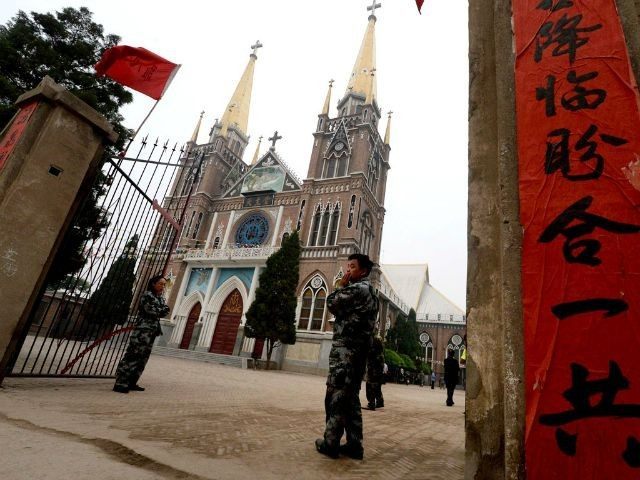Chinese officials in Wenzhou, a city of the Zhejiang province with a high concentration of Christians, have given Christian communities a deadline to remove rooftop crosses from their churches, but some of the local pastors have responded with defiance, placing guards at their churches to defend the crosses.
It is “likely that there will be clashes,” said a church representative in Tengqiao town.
The government ultimatum is the latest in a long-running campaign against the crosses. Authorities have already demolished hundreds of rooftop crosses from Protestant and Catholic churches, and in May, they enacted new regulations against any placement of the Christian symbol on top of buildings.
The new regulations for religious structures stipulated that any crosses must be affixed to the façade of buildings rather than above the roof, and could not measure more than one-tenth of the height of the façade. Crosses also must fit in with the façade and the surroundings.
Following the government crackdown on crosses, a number of church pastors defied the ruling, going so far as to replace demolished crosses, and in some cases, to put up bigger ones.
The regulations were deemed so offensive that even official state churches began to push back. “The rules make many unreasonable requests for Catholic and Protestant buildings,” said the state-backed Chongyi Church in Hangzhou, Zhejiang’s capital.
“They also excessively interfere in freedom for reasonable use of building interiors, violating the basic spirit of the state’s religious management,” the church said in an online statement to Zhejiang authorities.
On July 10, two official Church bodies in Zhejiang wrote an open letter of protest to the provincial government, demanding that authorities “stop immediately such ridiculous acts that split the party and the people.”
A dozen leaders of the provincial Catholic Patriotic Association and the Church Affairs Commission signed the letter addressed to the provincial Ethnic and Religious Commission, underscoring the gravity of the situation and the leaders’ obligation to speak out.
In the letter, the Church leaders described the cross removals as an “evil act that has to be stopped immediately” and that it had made Catholic priests and laity in Zhejiang “very angry.”
“The cross is a symbol of the Christian faith and some of the buildings are legally approved. It is unexplainable why it has to be forcibly removed,” an unnamed source said at the time.
Provincial authorities in Zhejiang responded to the letter by confiscating the official seal of the local Christian Council, which is necessary to issue valid official documents, understood as punishment for the council’s criticism of the government campaign.
Now, local officials have renewed demands for churches to remove the remaining crosses themselves, threatening to take them down if they did not comply, according to reports from three parishes under Wenzhou’s jurisdiction.
A member of the Yongqiang Parish told AFP this week, “Talk has been spreading that in the past two days, more than 10 crosses have been torn down in Wenzhou.”
Another pastor in Pingyang said that “almost all” of the county’s 135 churches had been ordered to remove their crosses.
“Until now, the crosses of small churches in rural areas have been removed. But it will come to the big churches in the end,” he added.
According to Bob Fu, president of U.S.-based China Aid Association, the pace of cross-removal has “definitely increased.”
“It seems there is a government directive to finish the campaign under a deadline,” he said.
Besides posting guards, other forms of resistance to the government policy have also emerged. Last week, Catholic Bishop Vincent Zhu Weifang of Wenzhou, who is almost 90, and 26 priests from his diocese protested outside government buildings to demand an end to the practice.
Moreover, Catholics and Protestants in the eastern province of Zhejiang have launched an “ecumenical” campaign to make small wooden crosses, painted red, and carry them everywhere.
Launched on social media, the idea of civil disobedience in a legal and peaceful manner has met with great success.
As part of this crusade dubbed “Build and Carry the Cross,” a Catholic priest has called on the faithful to join the “safe, legal and non-violent campaign,” adding that “as of tomorrow, we shall see crosses all over Zhejiang province.”
Follow Thomas D. Williams on Twitter @tdwilliamsrome.

COMMENTS
Please let us know if you're having issues with commenting.